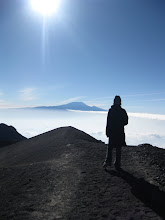When we got back from the river the children swarmed us. It was exactly as I imagined it would be. There are about ten children trying to hold each of my hands. The boys especially love Christian and he's turned into a "human climbing frame" as they say at the volunteer house. They took me to the classroom where I wrote swahili and english names for the animals that I drew. The kids love to show you what they wrote. They are so "keen to learn" as another volunteer said. The children are beautiful, but dirty, and so love the attention.
That night we had a social night at the TVE volunteer house. There's a huge group of volunteers right now, about 30 that came when I did, plus maybe 20 ish veteran volunteers. It was really fun to get to know everyone a little better and I already love this trip.
Day 5 -- Siku Tano
I cried for the first time today.
This morning Faraja (the owner of the orphanage) took us to visit the homes of the children who have been sick. The houses were generally mud huts about the size of a large bathroom. It's so dark inside. A few children would follow us in and sit on our laps and more would huddle by the door. They looked so beautiful when the light hit the edge of their faces. "Seven children sleeping here" Faraja says pointing to the broken bed and the foam mattress. "They are no matha no fatha" Faraja says, the one woman in the corner watches over all these children. He feels their foreheads to see if the children are ill.
The worst was further up the hill. We sat on rocks under what you could barely call a shelter next to a dieing fire. The mother wecomed us but barely looked at us. Her expression makes me think she lives and existance and not a life. There was a boy who looked to be about 7 years old. His clothes were so dirty and worn. He had a wide slightly darker scar from a skin disease under his right eye. He stared past us into the distance the entire time we were there. That was the most striking thing--he was so unresponsive. When Faraja asked him questions he barely responded with a quiet "mm." He recently had malaria and before that cholera. "Psychology affected" Faraha often says when talking about the orphans. Clearly. This boy sleeps on a sheet of ratty foam on the ground under this mud and stick shelter with only two sides and a tin roof. My emotional reaction to all this didn't really hit me until I got back to my room this afternoon. Now as I write this, I wonder where they all are now. Can they sleep? Are they afraid? Did they have dinner? A part of me doesn't want to know. No wonder religion is so important here.
The boy's little sister is unforgettable too. About two years old, in her tiny green patterned cloth and bare feet. Looking back the day already seems so surreal. Some twins who had cholera previously tottered around in back of a shop. Their parents and grandparents died in a fire accident. Arsen apparently. A Masaai girl has malaria. She coughs and we say pole sana (so sorry[empathy sorry]). "asante, thank you" she says in a small voice and smiles. Beyond adorable. Her mother holds up medicine, thank goodness. And they will take her to the hospital if she's not better in a few days. I knew I would have days like this.
In the afternoon we visited a widow's project. It is a friday afternoon african acrobatics and traditional dance show. They sell food and drinks, have some small animals on display, sell crafts/souveniers and also offer small excursions to nearby national parks. 90% of the money made goes to the widows and the orphans. This was started, or at least helped along, by past TVE volunteers. It was actually mostly TVE volunteers in attendance. It's an optimistic idea too, which helped today. I can't keep my eyes open. Time to sleep.
Okay, sorry to leave on a sad note, but I only have 3 minutes left and I still have to send an email to my mom. I'll try to write more soon. Kwa Heri (good bye).
